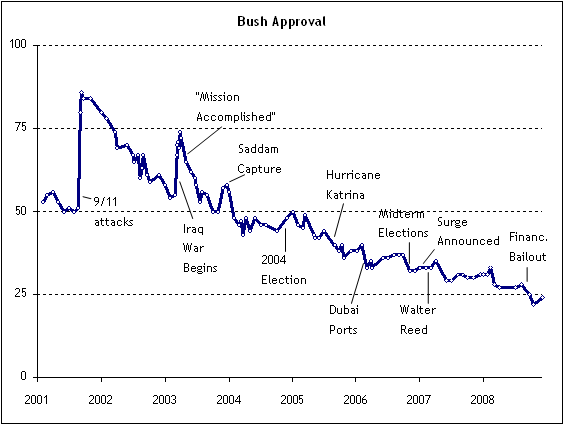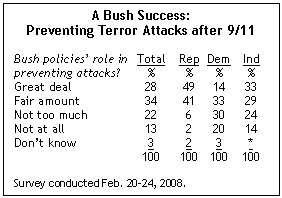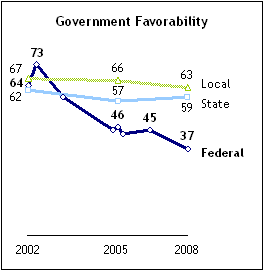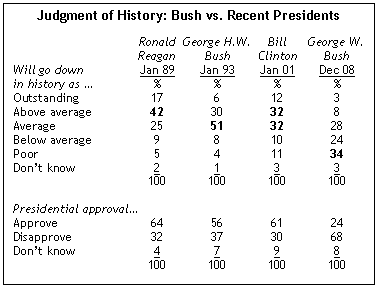Overview: Bush and Public Opinion
As George W. Bush prepares to leave the White House, the United States is in many ways dramatically different from when he took the oath of office in 2001. His first few months as president were largely unremarkable, despite the contentious 2000 election. But the horrific terror attacks of Sept. 11, 2001 greatly altered the course forward.
The attacks transformed American public opinion and fundamentally reshaped Bush’s image. His job approval rating reached 86% by late September. The public expressed broad willingness to use military force to combat terrorism. But then controversies over the build-up to war in Iraq and other Bush policies started to take their toll – at home and abroad.
U.S. forces quickly ousted Saddam Hussein in 2003, but could not create a lasting peace. As the fighting dragged on, Bush won re-election by a narrow margin. In his second term, he failed in his bid to build support for a partial privatization of Social Security. American deaths continued in Iraq, the government bungled the response to the devastating Hurricane Katrina in late 2005 and political scandal reached directly into the White House.

Soon, economic troubles started to mount, and in 2008, the economy went into a dangerous free fall that led to controversial and expensive government intervention in financial markets. The president’s approval ratings slid over time to historic lows. His approval last hit 50% as he started his second term. It stood at just 24% in early December.
Not surprisingly, the public’s verdict on the Bush presidency is overwhelmingly negative. In a December 2008 Pew Research Center survey, just 11% said Bush will be remembered as an outstanding or above average president – by far the lowest positive end-of-term rating for any of the past four presidents. Yet Bush’s impact on public opinion over the past eight years is seen in ways that go well beyond his personal unpopularity.
He helped shape the post-9/11 climate of opinion that was broadly accepting of a muscular approach to U.S. national security. And even after much of the public came to oppose the war in Iraq, there continued to be considerable support for the Bush doctrine of preemptive military action. In spite of the public’s shock over pictures of abuse of detainees at the U.S.-run Abu Ghraib prison, nearly half of Americans consistently said that the torture of terrorists to gain key information was at least sometimes justified.

In the final year of his presidency, even as his approval rating steadily declined to historic lows, most Americans continued to say Bush’s anti-terror policies deserve at least a fair amount of credit for preventing more terror attacks.
In his first term, Bush scored several early legislative successes on domestic issues – such as the No Child Left Behind education reform, two rounds of tax cuts and the launch of a significant Medicare drug plan.
But after those successes, the instances when Bush was able to mobilize – and maintain – public support for his agenda were rare. Even in the realm of national security, the public increasingly rejected the idea that a large military presence overseas would reduce the threat of terror at home.
Public backing for what was to have been Bush’s signature second-term achievement – reforming the Social

Security system – withered within months of his reelection. His immigration reform proposal faced opposition within his own party, even though it was an issue – like Social Security – where Americans recognized major change was needed.
What might have damaged Bush’s legacy most was his administration’s mixed record of competent governance. Between Iraq, the government’s flawed relief effort in the aftermath of Hurricane Katrina, and more minor missteps over the Dubai ports issue and other matters, the government “brand” deteriorated badly during the Bush years. In late April 2008, just 37% expressed a favorable view of the federal government, about half of the percentage of five years earlier (73%).
Final Judgments
In a Pew survey conducted Dec. 3-7 among 1,489 adults, the American public paints a harshly negative picture of Bush’s tenure. Nearly two-thirds (64%) say his administration will be

remembered more for its failures than its accomplishments, and a plurality (34%) says Bush will go down in history as a poor president. Fully 68% say they disapprove of Bush’s performance and most of those – 53% of the public – say they disapprove strongly. That is the highest rate of strong disapproval measured by Pew surveys in Bush’s eight years in office.
As his second term ends, only 13% say Bush has made progress toward solving the major issues facing the country; 37% say he has made those problems worse and 34% say he has tried but failed in his efforts. Another 11% say he has not addressed the major problems facing the country.
More than three times as many people say Bush will go down in history as a poor president (34%) than said the same of Bill Clinton at the end of his presidency (11%). About a quarter (24%) say Bush will be seen as below average and close to three-in-ten (28%) say he will be seen as average. Just 11% say he will go down in history as above average or outstanding.
Not surprisingly, the most critical assessments come from Democrats. More than half (53%) say Bush will go down in history as a poor president, while 25% say he will be remembered as below average. More than four-in-ten Republicans (44%) say he will be remembered as an average president; 21% say below average and 6% say poor. Two-in-ten say he will be remembered as above average, while 7% say outstanding.

Americans by a wide margin (64% to 24%) also say that in the long run the failures of the Bush administration will outweigh its accomplishments. The assessment of Clinton in 2001, despite controversy over how he had conducted himself in office, was virtually a mirror image. Six-in-ten said the accomplishments would outweigh the failures, and 27% said the failures would outweigh the accomplishments.
Just over half (52%) of Republicans say the Bush administration will be best known for its accomplishments. That number is significantly smaller for independents (20%) and Democrats (8%). When Clinton was leaving office, his own party (77%) and independents (60%) were much more convinced he would be remembered for his accomplishments.
Second Term Approval Slide

Between the start of his second term and December 2008, Bush’s approval rating dropped from 50% to 24%, a level that rivals the historic lows recorded by Gallup for Harry S Truman as he left office in 1952. Declines came across demographic and political groups, though significant divides still exist among those with differing political ideologies.
Approval among moderate and liberal Republicans saw one of the sharpest drops – from 82% to 50%. Conservative Republican approval dropped from 94% to 66%. Independent approval started at below half in 2005 – 47% – but dropped to 18% by December 2008. The change among Democratic groups, already highly critical of Bush, proved less dramatic. Approval among conservative and moderate Democrats dropped from 22% t o 8%, while approval among liberal Democrats dropped from 7% to 2%.
Bush’s approval dropped significantly among all education levels. In terms of age groups, the largest decline came among the youngest voters – those age 18-29. Within that group, approval dropped from 50% to 19%. The oldest group – age 65 and up – experienced a smaller decline, dropping from 47% to 26%.
A Legacy of War
When people are asked what they think Bush will be most remembered for after he leaves office, the most frequent responses volunteered are tied to the wars in Iraq and Afghanistan and the fight against terrorism. More than half (51%) of responses mention facets of the Global War on Terror, with close to three-in-ten (29%) specifically mentioning Iraq.

About 17% include specific negative assessments of Bush and his performance. Small percentages within that group refer to his competence (2%), his negative impact on the country (2%) or label him the “worst president” (2%). Another 13% refer to the impact of the Sept. 11 terror attacks, with 9% mentioning the attacks specifically and 3% noting that Bush had kept the country safe from major attack since that day. Another 12% mentions economic issues, including 7% who refer to the economy specifically, 4% who mention the current crisis and 3% referring to the recession. Another 4% offer positive assessments of Bush’s performance in office.
Meanwhile, concerns about Bush’s effectiveness are also seen in the one-word answers people give to describe their impressions of the president. In mid-2005, positive one-word descriptions outnumbered negative ones, but in more recent lists, the responses have been more negative. The most frequently mentioned description in the latest survey was “incompetent,” just as it was in February 2007 and March 2006. Many of the terms offered by respondents in the December 2008 survey are negative, though the second most frequently mentioned description was honest. Good and honorable also make the list.
The Global Outlook
On the foreign stage, a solid majority of Americans say the country is significantly less respected than in the past – and many of those people see that as a major problem. Many Americans are eager to turn inward to deal with this nation’s problems: fully 60% said in September 2008 that domestic policy should be the primary focus of the new president. And a greater percentage than before the Iraq war now say the best way to reduce the threat of terror is to reduce America’s military presence overseas, not increase it.
Meanwhile, a 2008 survey by the Pew Global Attitudes Project showed that majorities in 19 of the 24 nations – including several strong U.S. allies – had little confidence in Bush as he neared the end of his presidency. A 2007 survey of 45 nations found anti-American sentiment extensive as well as increasing disapproval for key elements of U.S. foreign policy.
And the image of the U.S. in the Muslim world remained abysmal. Iraq, the war on terrorism and American support for Israel continued to generate animosity in the Middle East, Asia and elsewhere. In many nations considered central to the war on terror, the general public deeply distrusted the United States. Even in countries like Kuwait that have long been considered relatively pro-American, the U.S. image had declined.
Among the few bright spots for Bush in the Global Attitudes surveys were the African nations that had benefited from administration programs to boost economic growth and reduce the spread of AIDS. In 2008, majorities in Tanzania and Nigeria expressed confidence in the president.
Still, Bush has had some success at home building support for tough tactics – including harsh interrogation policies for foreign detainees and government monitoring of phone calls or e-mails without warrants – to gather information about possible terrorists and stop potential attacks. On balance, more Americans say they worry that anti-terror policies have not gone far enough in protecting the United States than say they feel the anti-terror policies have “gone too far in restricting civil liberties.”
The Political Legacy
When Bush took office, Republicans controlled both Congress and the White House. But voter party preferences shifted significantly during Bush’s second term as missteps, bad news and scandals took their toll on Bush and GOP congressional leaders. In the 2006 midterm elections, more independents and moderates aligned themselves with the party out of power and Democrats took control of the House and the Senate.
In 2008, Bush was barely seen during the presidential campaign. Both Barack Obama and John McCain persistently criticized his administration, vowing to bring “change” to Washington. Obama’s significant win and additional Democratic gains in Congress signaled a continuing decline of the Republican Party under Bush.
In surveys conducted in the fall of 2008, 51% of all voters said they thought of themselves as Democrats or leaned toward the Democratic Party. That was up five points from 46% during the same period in 2004. Meanwhile, the number identifying with or leaning toward the Republican Party fell from 45% to 41%.
The greatest gains came among younger voters. Only among voters age 65 and older did the percentage identifying with the Democratic Party decrease – from 49% in 2004 to 47% in 2008. The percentage of voters age 18 to 29 identifying with the Democratic Party increased from 48% in the fall of 2004 to 61% in the fall of 2008. Democrats now outnumber Republicans by a margin of nearly two-to-one (61% to 32%) in this age group, up from only a seven-point advantage in 2004.
